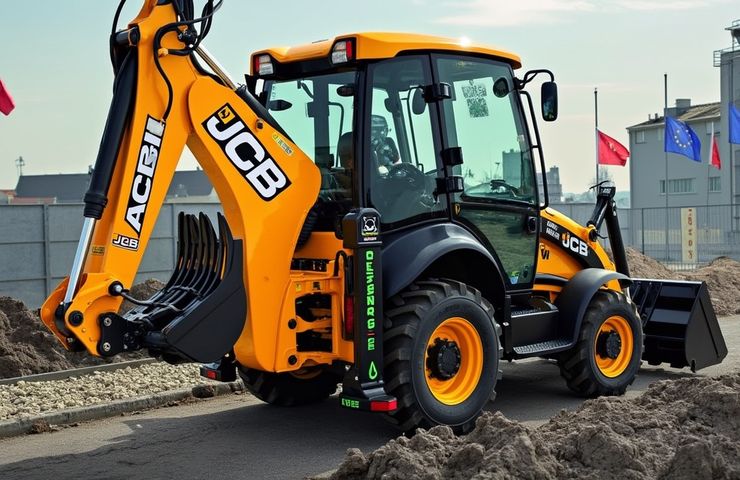
JCB Secures Landmark EU Approval for Hydrogen Combustion Engine Technology
May 27, 2025In a huge leap forward for industrial decarbonization, construction giant JCB has officially received full EU type-approval for its game-changing hydrogen combustion engine. It’s a big moment—not just for the company, but for the entire heavy machinery sector looking for greener ways to power up without going fully electric. This puts JCB right at the forefront of zero-emission tech in construction, offering a real-world alternative to the battery-only path so many others are taking.
Paving the Way in Europe: EU Approval Secured
JCB’s hydrogen-powered engine is now officially approved under the EU’s tough Stage V emissions standards. Translation? It runs nearly CO₂-free and ticks all the boxes for Europe’s strict environmental rules. That green light now opens the door for these machines to hit job sites across all 27 EU countries, plus additional territories in the broader European Economic Area.
This wasn’t some overnight win. It took four years and a cool £100 million in R&D to get here. Over 130 prototype engines were built and pushed to their limits in real-world testing—installed in machines like telehandlers and backhoe loaders, and trialed across the continent. The result? A tough, reliable engine holding its own alongside the diesel workhorses it’s designed to replace.
So, Why Hydrogen Over Electric?
We’re at a crossroads: governments are ramping up climate targets and carbon-cutting is top of mind—but heavy machinery has its own unique set of needs. While battery-electric options work well for lighter-duty, urban stuff, they often fall short in heavier, power-hungry roles. Too much weight, not enough juice, and long recharge times can be a dealbreaker on a busy job site.
That’s exactly where hydrogen combustion engines come in. JCB’s approach keeps the traditional engine design—one that operators and mechanics already know—while ditching the emissions. It delivers diesel-level power with a fraction of the environmental impact, all without reinventing the wheel. It’s a practical, powerful step toward zero-emission technology that works in the real world.
JCB’s Game Plan: Taking the Lead on Hydrogen
This move isn’t just about flashy innovation—JCB’s playing a bold, long-term game. They’ve deliberately built out a twin-track strategy that includes both electric and hydrogen-powered machines, giving them options as market needs and policies evolve.
That forward-thinking mindset sets them apart from the pack. As other companies scramble to identify clean energy solutions, JCB’s already got boots on the ground—and now European certification in hand. It’s not just about being greener; it’s about being smarter ahead of regulation shifts and rising customer demand for sustainability.
Impact Beyond JCB: A Shift in the Industry?
This approval could have ripple effects far beyond one company. EU regulators might take note and start seeing hydrogen combustion as a viable pathway in climate policy—especially in sectors that electric solutions simply can’t cover yet. It might even kick-start more serious investments into hydrogen infrastructure, an essential missing puzzle piece for large-scale adoption.
And let’s be real: the zero-emission conversation in heavy machinery has leaned heavily toward batteries. Until now. JCB’s breakthrough adds some major fuel to the fire of competition, giving the hydrogen camp a louder voice and a lot more credibility. It’s a bold challenge to the assumption that electric is the only way forward—and that changes the game.
What’s Coming Next?
With the regulatory green light, JCB is aiming to roll out its first hydrogen-powered machines commercially in 2025. While details like pricing and launch models are still under wraps, they’re now one big step closer to real-world deployment.
The big test will come soon enough—can hydrogen machinery handle the demands of real-life construction jobs? Project managers, rental companies, and public sector buyers finally have something tangible to consider. We’re not talking about some far-off future anymore. This tech is tested, certified, and nearly jobsite-ready.
Whether this kicks off mass adoption across Europe remains to be seen. But there’s no denying it—JCB just made a serious move toward cleaning up one of the world’s hardest-to-decarbonize sectors. And they’re not just following trends—they’re setting them.



 With over 15 years of reporting hydrogen news, we are your premier source for the latest updates and insights in hydrogen and renewable energy.
With over 15 years of reporting hydrogen news, we are your premier source for the latest updates and insights in hydrogen and renewable energy.
Well done JCB and I hope this technology will find its way to cars as an option to electric.
Agreed. Well done. Now, please open a 2nd factory in the US!
I love H2 combustion engines, but my experience with methane combustion engines and the cost for hydrogen and its source is mostly methane makes me think it’s stupid! Eliminate the hassle and use methane since it is almost as clean as H2.